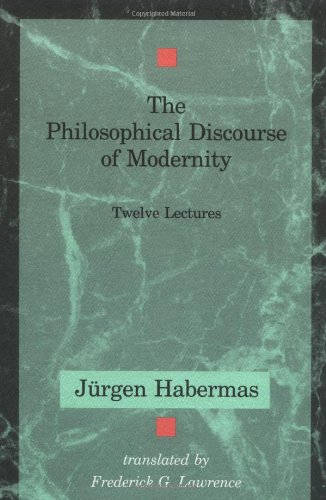The Philosophical Discourse of Modernity download
Par osborne linda le samedi, mars 18 2017, 01:27 - Lien permanent
The Philosophical Discourse of Modernity by Frederick Lawrence, Jurgen Habermas, Thomas McCarthy


Download eBook
The Philosophical Discourse of Modernity Frederick Lawrence, Jurgen Habermas, Thomas McCarthy ebook
Publisher: Polity Press
Page: 456
ISBN: 0745608303, 9780745608303
Format: pdf
Heidegger has no objection to such a rational framework if it is understood clearly to be a technical means (it is perhaps this distinction that Habermas occults in 'Philosophical Discourse of Modernity'). I don't agree with Habermas's critique of Horkheimer and Adorno [in The Philosophical Discourse of Modernity]. Paul quigley Says: August 10th, 2011 at 8:39 am. Horkheimer, Dialektik der Aufklärung, cit., pp. Habermas, The Philosophical Discourse Of Modernity: Twelve Lectures, Translated by Frederick Lawrence. The single most important reading of the first generation Frankfurt School is Jürgen Habermas' The Philosophical Discourse of Modernity . Try 'The Philosophical Discourse of Modernity', Jurgen Habermas …. Bernstein has an intriguing argument in Recovering Ethical Life in defence of Foucault and Derrida (and presumably other postmodernists) against Habermas' concerns outlined in The Philosophical Discourse of Modernity. Moments of fascinated shock, when those categories fall apart that guarantee in everyday life the confident interaction of the subject with himself and with the world (Habermas, The Philosophical Discourse of Modernity, pp. Cambridge, MA: The MIT Press, 1987. Should pick up a good unread copy on Amazon for a fiver … enjoy! Jürgen Habermas also employs excursuses (the English plural; not “excursi,” if we followed the Latin) in his masterful overview, The Philosophical Discourse of Modernity (1987). But maybe he has a minor point. It gave me better ways of thinking about modernity and much else besides. The Philosophical Discourse of Modernity by Jürgen Habermas. Jürgen Habermas, 'The Philosophical Discourse of Modernity' (1985). Thus, Habermas's project is rooted in modernity and Enlightenment with claims of universalization of action norms (discourse ethics) to institutionalize democratic deliberative polity based on the rule of law. Aletheia [unconcealedness; truth] could be the word that offers a hitherto unnoticed hint concerning the essence of esse [to be]. Since the 1960s the Frankfurt School has been guided by Jürgen Habermas' (born 1929) work on communicative reason, linguistic intersubjectivity and what Habermas calls “the philosophical discourse of modernity“.